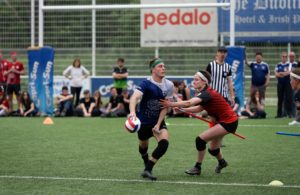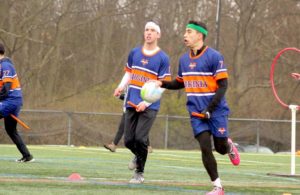- Rule, Britannia, no more?
- Unpopular Opinions: US Quadball Cup 2023
- Proven Contenders: University of Virginia
- Proven Contenders: Rutgers University
- Proven Contenders: University of Michigan
- Proven Contenders: Creighton University
- Different Perspectives: A Look Inside USA Ultimate
- Antwerp QC, Much of Belgian Core, Leaves Competitive Quidditch
On a Historical Note: the Appalachian Apparators
By Greg Astolfi
Guest Writer
This article is part of the “History of…” series curated by The Eighth Man and US Quidditch. The series highlights the individual histories of teams that qualified for US Quidditch Cup 10 to help both players and spectators get to know the story behind the teams. Head over to this link to read more.
The Appalachian Apparators, now in their fourth official year of existence, burst onto the IQA/USQ scene in the fall of 2013. Since joining USQ, Appalachian has never failed to qualify for a World Cup/US Quidditch Cup.
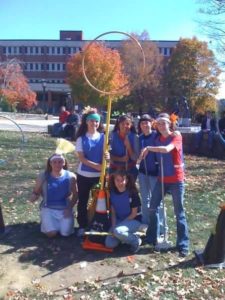
Credit: Ginny Ostgaard
Appalachian was first formed as an unofficial team in fall 2009—under the name Appalachian Quidditch—when collegiate quidditch was still in its early stages. The team began as a meager group of seven friends playing with hoops made of traffic cones and hoola hoops. However, slowly but surely, the group attracted more members. In the fall of 2011, the group had its first large influx of players thanks to its participation in the Carolinas Quidditch Conference, where the team began competing unofficially against other North Carolina teams. Appalachian even capped off the spring season in 2012 as the Greensboro Gauntlet champions–the then unofficial state championship–winning a close game over in-state rival UNC.
The first major change for Appalachian came in the fall of 2012. World Cup V had generated a great deal of hype and the first ever regional championships had been announced. Excited about the prospect of qualifying for World Cup VI, the young players on Appalachian proposed joining the league as an official team and attending the first Mid-Atlantic Regional Championship. However, the current leadership was antipathetic to the idea. They were not ready to shift the team’s mentality away from a fun, Harry Potter-inspired activity. These competing visions for the future would cause a rift within the club and spelled trouble for the existence of the team.
The young, more competitive core of players left and helped form the community team QC Carolinas. The newly formed community team decided take their chances on a World Cup bid and registered for the regional, despite the fact many of the players had never played in an official tournament. There was also a lack of chemistry and organization, due to the Carolinas consisting primarily of players from Appalachian, UNC and a few graduates of other Mid-Atlantic schools. Many of the members met for the first time in the hotel parking lot. It truly was a ragtag group of players coming together with the sole purpose of qualifying for World Cup. Despite the aforementioned struggles, the stars aligned and the team was able to sneak away with a bid by defeating Virginia Tech, 2-0, in a hotly-contested three-game series in the Round of 16.
The team continued to compete in tournaments leading up to World Cup in April. This gave the Appalachian players on the Carolinas squad valuable exposure to high-level competition. They began to develop a good sense for the sport and honed their skills. The fairytale season, however, would end in a disastrous 0-4 showing in Kissimmee, Fla. The failure to perform on the national stage as well as competing visions for their independent programs would eventually lead to the fracturing of the Carolinas.
Disappointed in their World Cup performance and the discord within the Carolinas community team, the portion of the squad that was composed of Appalachian players decided to go back to their original team and revitalize the program in the fall of 2013. After winning the club elections, former Carolinas members Greg Astolfi, Sam Luke and Abbi Pittman founded Appalachian Apparators Quidditch: a USQ-official community team based in the High Country area. With a season of USQ experience under their belt, the new leadership decided that their goal was to qualify for World Cup VII, but this time as Appalachian. They began recruiting players with a new, more competitive vision for the team.
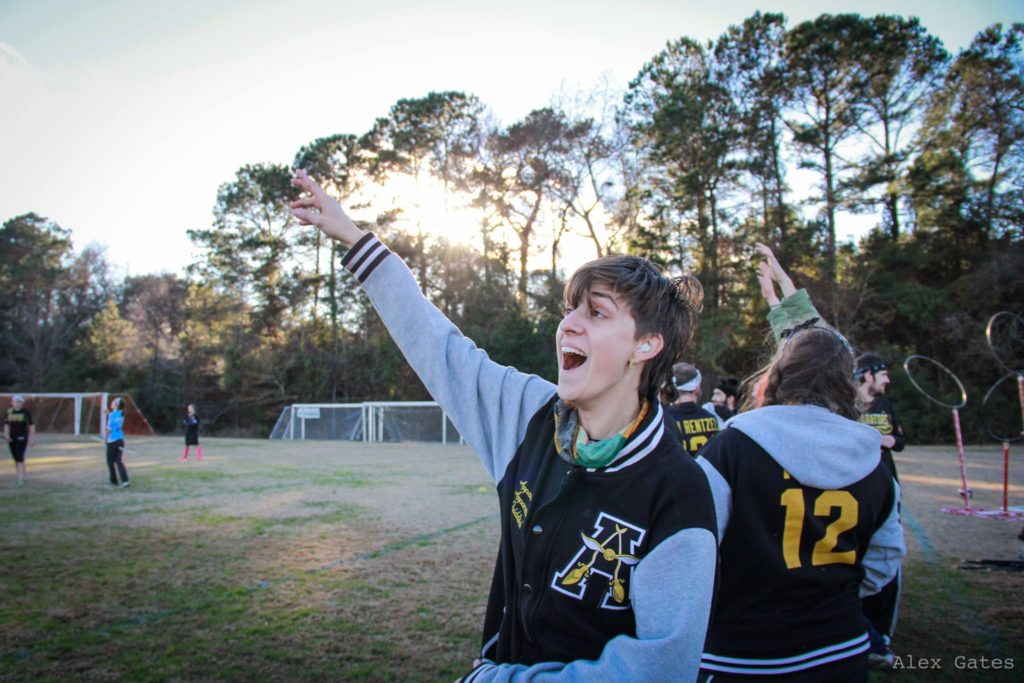
Credit: Alex Gates
The road to World Cup would not be easy. The team was only able to attend one official event at Virginia Tech prior to their regional. They went 1-1, beating University of Virginia and falling to University of Richmond. Still, the strong performance against what was then strong, mid-tier competition proved to be good motivation for the team. They showed up to the Mid-Atlantic Regional Championship as a pot three team and performed just as expected by going 2-2. Their even record would see them draw a tough matchup against Johns Hopkins University in the Sweet 16. Tempers flared with a bid on the line in a 44-minute slugfest. Eventually John Hopkins proved too much and Appalachian and pulled to end the game (180-110*). The team bet on securing a bid through the consolation bracket.
Appalachian breezed through the Philadelphia Honey Badgers (160*-10) and thus set the stage for a do-or-die rematch with Virginia. Both teams competed hard in less than optimal conditions. The temperature was well below zero with wind gusts of about 20 mph. The game went back and forth before Appalachian seeker Ancrum Ballenger finally pulled the snitch. After a lengthy deliberation, the catch was ruled good and Appalachian beat Virginia 100*-60, punching their ticket to World Cup VII. There, they finished pool play 2-2 and, eventually falling to the Ottawa University on a snitch catch in the play-in round of brackets.
Though many would not consider a play-in finish at World Cup a huge success, the leadership of Appalachian could not have been more thrilled with what their team had accomplished in such a short period of time.
Having achieved their first-year goals, the captains set their eyes on loftier prizes for their next season. The goal was not only to qualify, but to make a deep run at the Mid-Atlantic Regional Championship and World Cup. Fall 2014 saw the arrival of arguably the best recruiting class in the team’s history. The team grew to almost 50 members between the competitive and practice squads. Appalachian’s roster boasted a slew of new talent that helped the team start its season with a finals run at the Greensboro Gauntlet. They would follow up their Gauntlet performance with a quarterfinals run at Turtle Cup where they fell to the University of Maryland. Both tournaments gave the newly-recruited players valuable experience heading into their regional, where the team finished second in their pool and secured another bid to World Cup with relative ease. However, after a strong day-one performance, the team would bow out in the quarterfinals with an underwhelming showing against Richmond.
The team entered World Cup VIII as a bit of an enigma. In only their second official year in existence, many teams outside of the Mid-Atlantic had never heard of Appalachian. However, Appalachian had prepared well, flying under the radar. They drew a tough matchup for the first round of the newly added SWISS format, playing University of Rochester—the core of which would later help build Rochester Whiteout and Rochester United. Appalachian came ready to play and got off to a strong start matching Rochester through snitch on pitch. Unfortunately Appalachian would lose on snitch catch 110*-70. This set the stage for a second-round matchup with a physical UTSA team. At the onset, Appalachian was not prepared for the physical, Southwest brand of quidditch and UTSA jumped out to a big lead. The Apparators would fight back into the game only to suffer another loss on an accidental, premature snitch catch. Appalachian thought the catch would force overtime, however, UTSA had scored a goal just moments before. After much deliberation, the refs ruled that the goal had occurred prior to the catch and thus the Apparators had handed themselves their second loss. After games against the Long Beach Funky Quaffles, University of South Carolina and University of South Florida, the team would finish 3-2. Strength of schedule and tiebreakers would not see them into bracket play. This was a tough blow for the team. They had played well the whole tournament, but unfortunately would be eliminated by just a couple of snitch-on-pitch miscues. Nevertheless, the experience would help the young players on the team forge ahead.
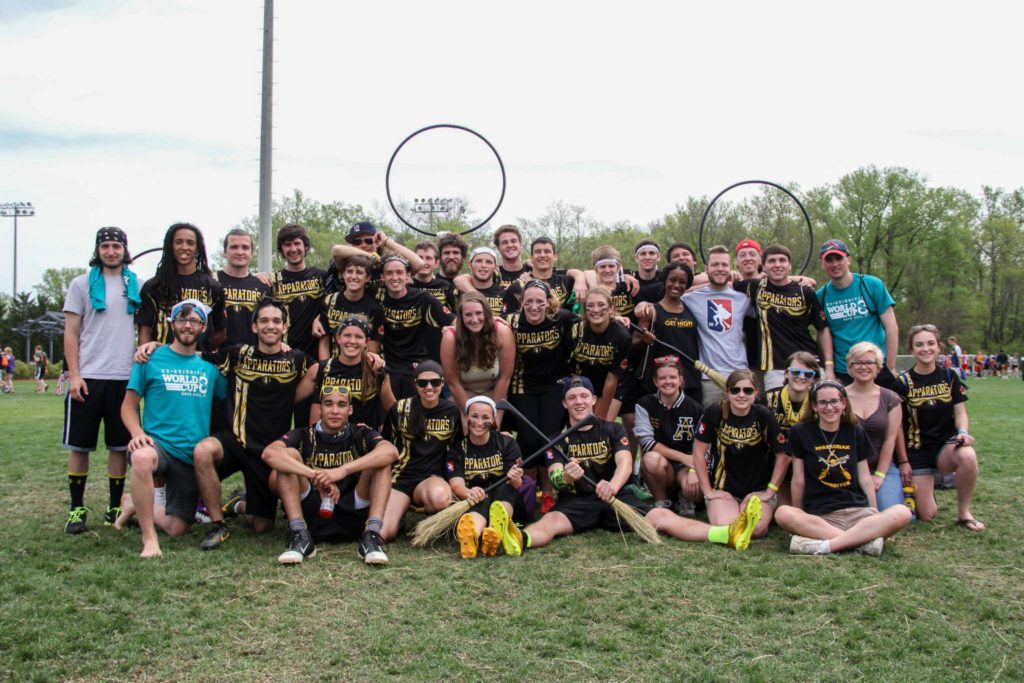
Credit: Alex Gates
After this season, the team faced the first change in leadership since joining USQ. The players who had started the team were leaving Boone, N.C. and it would be up to the newly-recruited players to carry the team forward. Appalachian entered 2015-16 with a mixed bag of results. In addition to the aforementioned loss, they had an up-and-down fall season with high points such as playing Ball State University in range, but also lows such as losing to a weak Virginia Tech team that would fail to qualify for nationals. Despite the rocky start, the team would come together and put up a solid showing at the Mid-Atlantic Regional to once again claim their spot at nationals.
In the second half of the season the team really began to click, entering US Quidditch Cup 9 with a spring record of 8-1. They entered nationals as a pot-three team, but the favorite to finish second in their pool. The team would ultimately finish pool play behind University of Texas and Southern Storm, but still earned a spot in the play-in round. Despite the progress the team made, they would once again fall in the play-in round. This time to the community team the Fighting Farmers.
This season, Appalachian already boasts a number of strong performances, including a snitch-range game against perennial Mid-Atlantic powerhouse Maryland. They have earned another bid to nationals and hope to take the team into bracket play for the first time in the program’s history. Since joining USQ, Appalachian has never missed a qualification for nationals; however they have also never made a run into bracket play. Qualifying for Nationals is an amazing accomplishment for a new team. As a four-year program, Appalachian is still seeking that signature season where they could surprise everyone and make a Cinderella run.

